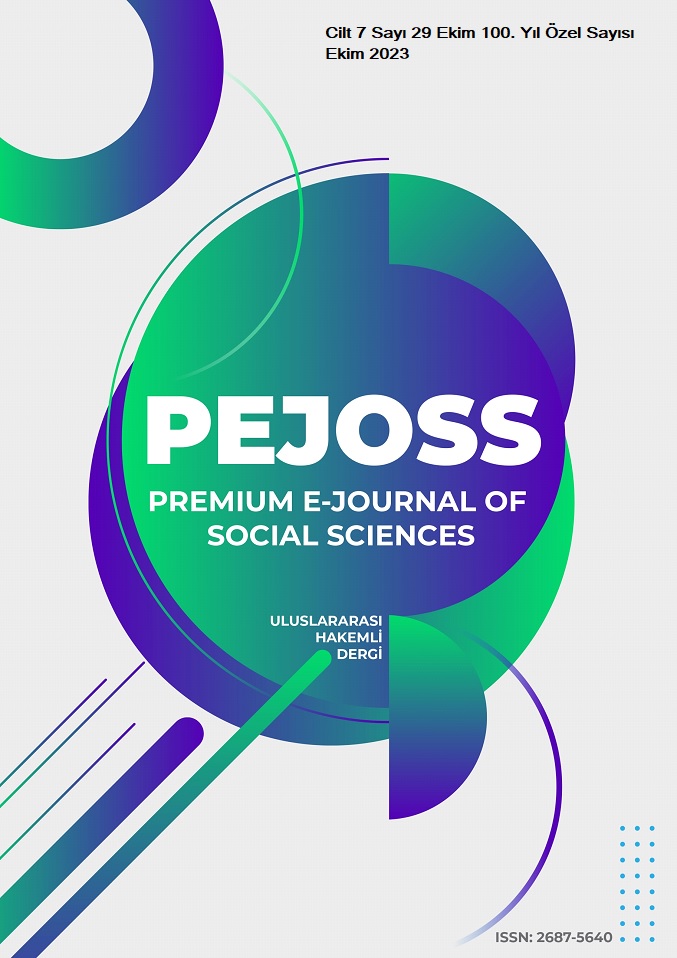Psychological Foundations of Economic Behaviors: Behavioral Economics
DOI:
https://doi.org/10.5281/zenodo.10056060Keywords:
Behavıoral Economıcs, Psychology, economyAbstract
Economics has benefited from mathematics for a long time in the solution of problems faced in economics. This process prevented economics from being in a structure related to other sciences. When the process from past to present is examined, many economic theorists have used mathematical formulations because the phenomena in the economy are measurable and testable. However, some economists argue that economics is a social science with human factors, revealing that it is directly related to humans. Therefore, the complexity and unpredictability of human behavior has made it necessary to review economic theories. Because behaviors vary from person to person and is a unique action for each person.
This phenomenon revealed that economic situations cannot be done only by mathematical methods and emphasized that psychology should also be included in this phenomenon. In addition, unlike traditional economics, which theorizes human behavior with mathematical data, 'behavioral economics', which includes people's psychology and sociological structures in the analysis, has changed the conceptualized world of economists and enabled them to look at it from a comprehensive perspective. At this point, behavioral economics aims to contribute to economic science by including psychological elements in people's economic behavior. The aim of this study, which examines behavioral economics- brings psychology and economics together- is to provide information about the emergence and developments of behavioral economics based on examples in the literature, and to show how people behave in the economic decision-making process, taking into account psychological elements
Downloads
References
Akerlof, G. A. & Kranton R. E. (2000). Economics and Identity. The Quarterly Journal of Economics, CXV:3, 715-753. https://doi.org/10.1162/003355300554881
Aktan C. & Yavuzaslan C. (2020). Davranışsal İktisat: Bireylerin İktisadi Karar Ve Tercihlerinde Zihinsel, Duygusal Ve Psikolojik Faktörlerin Analizi. Sosyal ve Beşeri Bilimler Dergisi, 2(12), 100-120.
Akyıldız, H. (2006). Freud’çu Liberal ve Marksist Kişilik Kuramlarının Türevi Olarak Toplum, İktisat ve Siyaset Teorileri. Akdeniz İ.İ.B.F. Dergisi, 11, 1-23.
Angner, E. & Loewenstein G. (2006). Behavioral Economics. http://sds.hss.cmu.edu/media/pdfs/ loewenstein/BehavioralEconomics.pdf.
Bakırcı F., Sarıkaya M. & Bayraktar A. (2021). Bireysel Kararların Davranışsal İktisat Açısından Değerlendirilmesi, Atatürk Üniversitesi İktisadi ve İdari Bilimler Dergisi, 35(4), 1223-124.
Basılgan, M. (2008). İktisadi Psikoloji: Teori ve İhracatçı Müteşebbis Karar Profili Üzerinde Bir Uygulama. [Yayınlanmış Doktora Tezi]. Uludağ Üniversitesi Sosyal Bilimler Enstitüsü.
Buğra, A. (1995). İktisatçılar ve İnsanlar. İletişim Yayınları.
Camerer, C., Rabin M. & Lowenstein, G. (Eds.). (2004). Behavioral Economics: Past, Present, Future. Advances in Behavioral Economics. Princeton, NJ: Princeton University Press. 3-51.
Can, Y. (2012). İktisatta Psikolojik İnsan Faktörü: Davranışsal İktisat. Hukuk ve İktisat Araştırmaları Dergisi, 4(2), 91-98.
Earl, P. E. (2005). Economics and Psychology in the Twenty‐Century. Cambridge Journal of Economics 29(6), 909‐926. DOI: 10.1093/cje/bei077
Eser, R., & Toıgonbaeva, D. (2011). Psikoloji ve İktisadın Bileşimi Olarak Davranışsal İktisat. Eskişehir Osmangazi Üniversitesi İİBF Dergisi, 6(1), 287-321.
Frantz, R. (2019). The Beginnings of Behavioral Economics: Katona, Simon, and Leibenstein’s X-efficiency Theory. Academic Press.
Güneş İ. (2021). İktisat Ve Psikoloji İlişkisi: Davranışsal İktisat. International Journal of Disciplines Economics & Administrative Sciences Studies, 7(30), 450-455. http://dx.doi.org/10.26728/ideas.433
Hattwick, R. E. (1989). Behavioral Economics: An Overview. Journal of Business and Psychology, 4:2, 141-154. https://doi.org/10.1007/BF01016437
Matsuyama, N. (2009). Relativity of Alfred Marshall’s Psychological Research and Economics. http://room409‐1.ih.otaru‐uc.ac.jp/~yss2009/papers/Matsuyama% 2020090325.pdf.
Küçüksucu M., Konya S. & Karaçor Z. (2017). Davranışsal İktisat Ekseninde İktisatta Psikolojik Arka Plan, 2nd. Internatıonal Congress on Politikal, Economic and social Studies.
Ruben, E. B. (2013). İktisadın Unuttuğu İnsan. Bağlam Yayıncılık.
Ruben, E. & Dumludağ, D. (2015). Davranışsal İktisadın Gelişimi. İktisat ve Toplum Dergisi, (58), 4-9.
Otto, A. M. C. (2009). The Economic Psychology of Adolescent Saving. [Yayınlanmış doktora tezi]. University of Exeter.
Önder, İ. (2015). İktisat ve Psikoloji. İktisat ve Toplum, (58), 34-38.
Scitovsky, T. (1973). A New Approach to the Theory of Consumer Behavior. The American Economist, 2(17), 29-32. http://www.jstor.org/stable/1828835
Simon, H. A. (1955). A Behavioral Model of Rational Choice. The Quartely Journal of Economics, 110-113. https://www.jstor.org/stable/1884852
Soydal, H. (2010). Yeni ekonomi: Kuantum-Nöroekonomi. Palet Yayınları.
Şen S. & İncekara B. (2012). İktisat Ve Psikoloji Etkileşiminde Davranışsal İktisat. Hukuk Ve İktisat Araştırmaları Dergisi, 4(1), 235-244.
Şimşek H. & Kurt M. (2019). Tüketici Davranışlarının Davranışsal İktisat Açısından Değerlendirilmesi. Internatıonal Balkan University, 5 (14), 215-222. DOI: 10.29228/TurkishStudies.23032
Thaler, R. H. & Camerer, C. (1995). Anomalies: Ultimatums, Dictators and Manners. The Journal of Economic Perspective, 2(9), 210. DOI: 10.1257/jep.9.2.209
Ünsal, E. (2010). Mikro İktisat, (8. Baskı), İmaj Yayınevi.
Downloads
Published
How to Cite
Issue
Section
License
Copyright (c) 2023 Premium e-Journal of Social Science (PEJOSS)

This work is licensed under a Creative Commons Attribution 4.0 International License.


